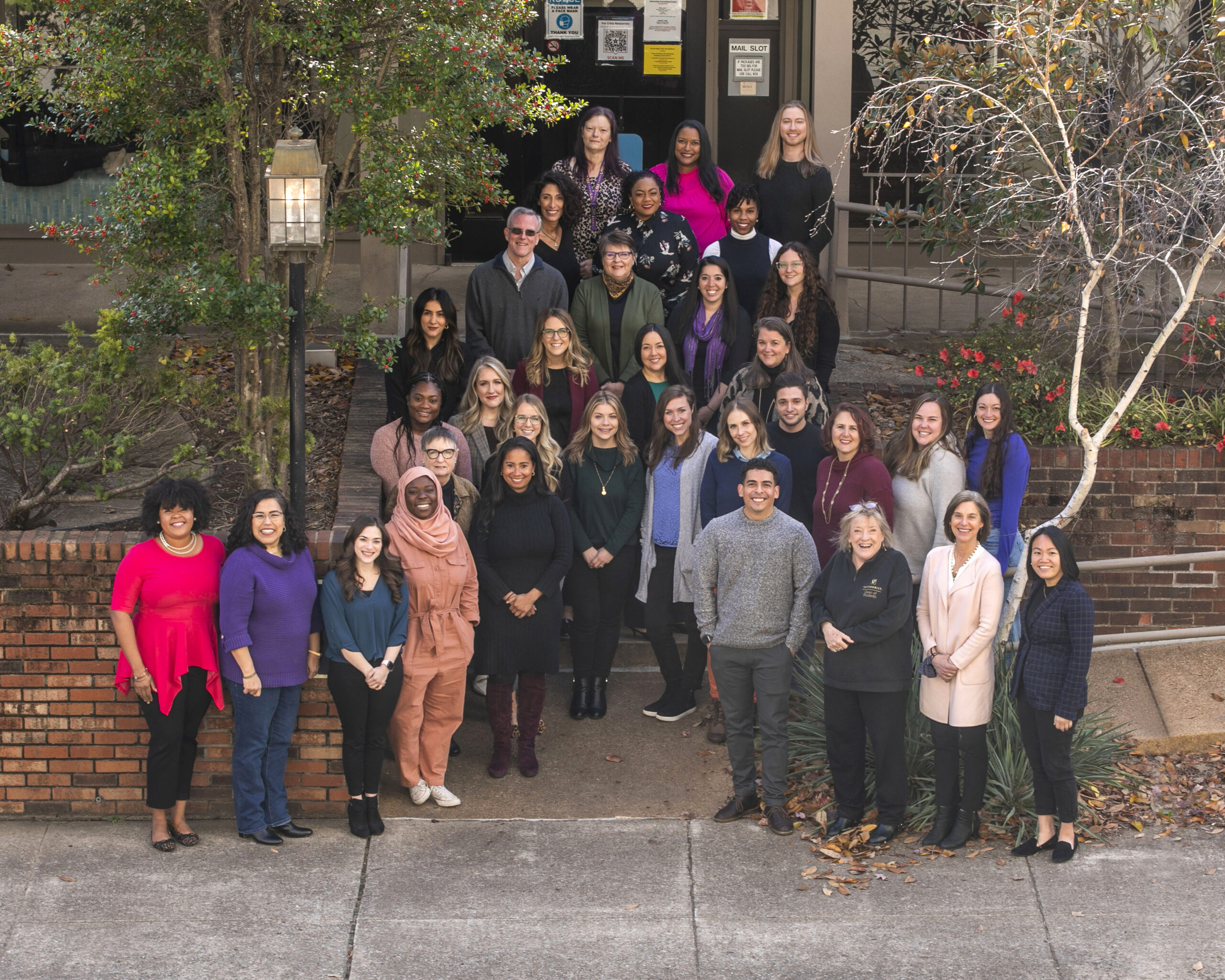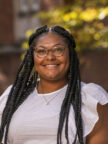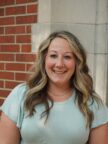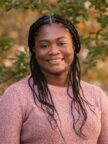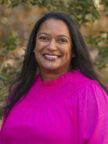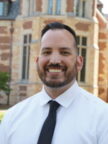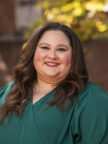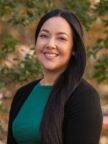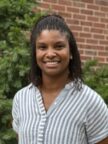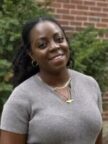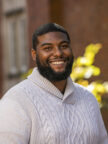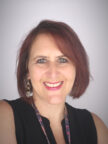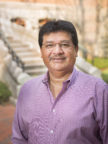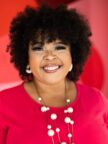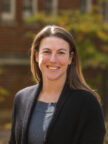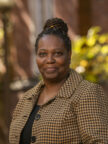Meet the Staff
The UCC is a united and compassionate team dedicated to social justice, equity, and inclusion. Our doors are open to serve and affirm students of color and students with minoritized identities. Every UCC staff member takes pride in providing a validating and safe space for all of our students who may experience discrimination, prejudice, or violence as a result of white supremacy and additional systems of oppression. Our UCC providers engage in regular staff-wide trainings, educational opportunities, personal introspection, and professional development to increase our cultural humility and advocacy on behalf of the Vanderbilt student community. We are here for you. We welcome you. You are valued.
Staff
Aneesa Anderson, M.S., NCC
Social Justice and Inclusion Counselor
Pronouns: she/her/hers
I believe a good counselor is one that can meet their client where they are while providing empathy, genuineness, and a safe space to share their story. My approach to counseling is one that is relational, collaborative, and not only understands but emphasizes how diverse each person is. I work from a relational, cultural, feminist, and existential approach. Together we will help you shift from managing to thriving academically, socially, and emotionally. I am passionate about serving individuals within systemically oppressed groups and first gen folx.
Stacey Appiah-Opoku, MA, LPC-MHSP, NCC
Assistant Director for Clinical Operations
Pronouns: she/her/hers
I believe we all have parts of our identities that influence how we move through the world and process experiences. As such I believe an important part of therapy involves exploring and affirming all salient parts of your identity. I will support you in sharing your story, identifying your values, experiencing your emotions and building skills to work towards your goals.
Marlon Bailey, LCSW, Ph.D., HSP
Athletics Psychologist
Pronouns: he/him/his
I approach counseling relationships by partnering with individuals to address the superficial and substantial parts of the obstacles to living and feeling well. This often includes managing the intricacies of identity, environment, hopes, and practical health indicators.
Vanessa Bell, Ph.D., HSP
Psychologist
Pronouns: she/her/hers
I support students by providing psychological assessments to better understand various factors that may be adversely impacting their academic, emotional, social, and/or other areas of functioning. Working together, we will collect important pieces of the diagnostic puzzle and identify the most appropriate diagnoses, treatment recommendations, and supportive resources.
Heather Boyd, LCSW
Therapist
Pronouns: she/her/hers
I believe life is all about balance. In therapy, that often means balancing change with acceptance. I try to create a safe place where clients can fully explore areas of life they would like to accept and areas of life they would like to change.
Brian Cantrell
Electronic Health Administrator
Pronouns: he/him/his
As an EHR Administrator, I am committed to leveraging technology to enhance the delivery of healthcare services to improve client outcomes. I continuously seek opportunities to enhance the system, integrate new modules and features, and provide training and support to users.
Mary Clare Champion, Ph.D., HSP
Associate Director for Administration and Clinical Services
Pronouns: she/her/hers
My goal as a therapist is to meet students from all programs and identities and support them in their time at Vanderbilt, creating a safe space together in which to determine strategies to help navigate stressors and challenges that may have interfered with them succeeding in their academic or personal lives.
Nalini Conner, Ph.D., HSP
Assistant Director for Training
Pronouns: she/her/hers
“It’s okay to feel what you feel- it’s what you do with those feelings that is the most important.” I believe that therapy is a space to learn how to better understand your emotions, what may be contributing to them, and how to respond to them. My goal is to provide a safe, collaborative space for all clients where they can learn the individualized tools they need to help them navigate through any difficulties.
Tara Duffie, MA, DNP, PMHNP-BC
Psychiatric Mental Health Nurse Practitioner
Pronouns: she/her/hers
I believe that mental health is self-care. My goal is to promote a collaborative environment where we can build a genuine therapeutic partnership. I strive to promote an inclusive, safe space to welcome all students.
Julia Dyer, BSN, RN
Registered Nurse
Pronouns: she/her/hers
I recently heard, “if the conversation is boring, you are probably not listening.” I believe everyone has a story worth telling, and we can count ourselves privileged if we get to listen. It is an honor to be invited into the lives of others. Whether at work, the grocery store, or on a plane ride, it is my hope to see, delight in, and engage with the person in front of me. As a nurse, I believe much of physical health stems from mental health. Here at the UCC, I hope to assist students toward their mental health goals, allowing them to flourish in their studies, social settings, and overall wellness.
Viviana Grice, LPC/MHSP, NCC
Senior Therapist
Pronouns: she/her/hers
I strive to offer students a safe and confidential space where they are invited to a journey of self-exploration and growth. I work in collaboration with my clients toward unveiling and ending the cycle of self-defeating behaviors that have been barriers to reaching their full potential.
Fluent in Spanish.
Amber Hopkins, MSN, PMHNP-BC
Psychiatric Nurse Practitioner
Pronouns: she/her/hers
I strive to provide patient-centered care that is both compassionate and inclusive to all students. My goal as a psychiatric nurse practitioner is to support students through their academic journey by developing strong therapeutic relationships and using evidence-based medication management.
Ruth Howard, Ph.D., HSP
Associate Director for Training
Pronouns: She/Her/Ella
I am humbled by the strength and resilience that students exhibit every day, and it is a privilege to support them on their academic journey. In therapy, I strive to collaborate with students to create a warm, affirming, compassionate, and validating space for growth and healing to take place. As a provider who identifies as Latina and immigrated to the US as a child, my identities also inform my professional values, which are rooted in liberation psychology and include a commitment to empower students by honoring their unique lived experiences and strengths, exploring the impact of systems of inequity, and advocating for meaningful change.
Speaks conversational Spanish.
Leah Jesse, MD
Child, Adolescent, and Adult Psychiatrist
Pronouns: she/her/hers
I consider it a privilege to be entrusted with the care of students as they embark on a journey of healing from some of life’s greatest challenges. My goal is to bring warmth, empathy, and a non-judgmental attitude to every encounter, so that each student feels empowered to be their truest self. I strive to provide patient-centered care through a treatment relationship grounded in mutual respect and guided by students’ unique values and goals. My training in child, adolescent, and adult psychiatry has given me a breadth of knowledge on the presentation of mental health disorders across the lifespan and a recognition of how different life stages influence treatment goals.
Kristen Johnson, M.S., M.Ed.
Doctoral Intern
Pronouns: she/her/hers
I am deeply honored by the courage and vulnerability required to participate in the therapeutic process, and I strive to help students do so by creating a validating and collaborative space where they can explore and understand both themselves and the challenges that they are experiencing. My hope is that clients who work with me will leave therapy feeling encouraged and empowered to work toward personally meaningful life goals with intention.
Tess M. Kilwein, Ph.D., HSP, ABPP, CMPC
Sport Psychologist
Pronouns: name/she/they/Dr.
My treatments are feminist-, multicultural-, and liberation-informed and I am active in creating a non-judgmental, anti-racist, and decolonized therapy experience for student athletes with a variety of lived experiences and identities.
Karli LaGrotte, Psy.D.
Postdoctoral Fellow
Pronouns: she/her/hers
As a therapist, I strive to create an open, affirming, non-judgmental, and collaborative therapeutic space. I do my best to understand each client, their presenting concerns, and provide support that addresses their unique needs. In addition, I believe it is important to honor identity/difference and acknowledge the oppressive social forces that impact mental health.
Shanice Martin, M.A.
Doctoral Intern
Pronouns: she/her/hers
My aim is to provide students with culturally sensitive tools and a safe space to navigate the challenges that come with life and personal growth. I believe in honoring salient identities and experiences throughout the therapeutic process, understanding that change is not a linear path but a complex journey requiring patience and perseverance.
Nora McNulty, M.A.
Doctoral Intern
Pronouns: she/her/hers
I believe in the healing power of personal insight. In understanding the why behind our struggles, I believe we are better equipped to influence how we cope with them. My goal as a therapist is to provide clients with a safe space to do the necessary self-reflection – exploring their thoughts, feelings, behaviors, recurring patterns, identities, prior experiences, etc. – to better know themselves, and ultimately, to lead more intentional and fulfilling lives.
Jordan D. Mike, Ph.D.
Urgent Care Counselor
Pronouns: He/Him/His
I believe both clients are on a journey to find a place where they belong, and while it can be confusing to know where one can feel safe and validated there is a place for everyone. There are inherent systems of both oppression and power that come into play and affect the overall wellness and daily lives of everyone. As a counselor, I aim to create a warm, authentic, and empathetic space where clients can freely explore their identities and share their stories and experiences. I will be there to help you navigate your journey to healing, community building, reconnection, and empowerment.
Martez Nelson, LPC-MHSP
Assistant Director for Community Engagement
Pronouns: he/him/his
My goal is to provide you with a safe, welcoming, and empathic space to navigate your challenges and goals. I work from a strengths-based approach, and we will use this approach to help you find new ways of managing your academic, social, and emotional needs. I am passionate about serving individuals within the LGBTQ+ community, and other marginalized groups including, black and brown folx inclusive of all gender identities.
Frances Niarhos, Ph.D., HSP
Psychologist
Pronouns: she/her/hers
I enjoy helping young adults identify potential barriers to their academic success using well-established measure of cognitive, academic and mental health functioning. I also have a passion for teaching and mentoring trainees across all mental health disciplines as they prepare for professional roles as psychologists, clinical social workers and professional counselors.
Wenzhi Pan, M.S.Ed
Social Justice and Inclusion Counselor
Pronouns: she/her/她
Acknowledging how socioeconomic, political, physiological, and other factors impact our college experience, I aim to offer culturally responsive and trauma-informed care to my clients. As a Chinese-born therapy provider who came to U.S. at 18, I recognize the complexities of intersectionality and use an integrated approach drawing from different theories to provide individualized interventions for my clients so they can reconnect with their innate resilience and restart their journey.
Also provides services in Mandarin.
Melissa Porter, Psy.D, HSP
Associate Director for Clinical Operations
Pronouns: she/her/hers
My goal is to provide a space where I can provide support and guidance on working through the various challenges that life brings, where a student can feel heard, validated, and challenged while making decisions that best fit their life.
Bhupendra Rajpura, M.D.
Psychiatrist
Pronouns: he/him/his
My approach to your care is to understand you. I want to develop a care plan based on your concerns that is “YOU”-centric and encompasses most recent treatment guidelines within a holistic approach. I like to work with you to achieve optimum outcomes resulting in a healthy body and healthy mind.
Elise Scott, M.D.
Psychiatrist
Pronouns: she/her/hers
I seek to support students through a partnership founded in compassion and mutual respect. My medical background provides me with a strong neuroscience foundation for treating mental illness — one which challenges dualistic views of mind and body. My approach combines open-minded listening, psychotherapy, lifestyle interventions, and medication management to help students gain resilience, discover their personal identity, and work toward authentic, value-driven lives.
Ciera Scott, Ph.D., HSP
Associate Director for Community Engagement
Pronouns: she/her/hers
While honoring your unique identities, I collaborate with clients in exploring how your background may impact your current thought patterns, your self-esteem, your mood, and how you experience your present relationships.
Kyle Shadrick, LCSW
Therapist
Pronouns: he/him/his
Hi there! My name is Kyle Shadrick. I am a Licensed Clinical Social Worker(LCSW) in the state of Tennessee, and a therapist at the UCC. In addition to individual therapy, I am also currently the co-chair of the UCC’s diversity alliance, and co-facilitator of the Continuum support group. I am passionate about working with trauma and LGBTQIA+ individuals. I am also a Certified Transgender Care Therapist through ITCA.
Tamaki Silver, Psy.D., HSP
Psychologist
Pronouns: she/her/hers
My goal is to create a space in which students can feel comfortable discussing challenging experiences and relationships, build resilience and learn how to cope, and develop their own individual identity. I hope to make this a collaborative experience, one where we can engage in problem solving and exploration around all aspects of personal and professional development, while also sharing in some laughter.
Stephanie Singer, LPC-MHSP, NCC
Therapist/Practicum Coordinator
Pronouns: she/her/hers
As a therapist, I try to create a welcoming space for you to feel comfortable and safe exploring areas in your life that need support. I believe in the importance of allowing yourself to be vulnerable, working towards life balance, and creating boundaries with yourself and others. I hope to help you navigate these areas through a collaborative and unique approach, catered to your needs. My goal is to help you gain the confidence, skills, and tools to continue this growth.
Julie Sutcliffe, PsyD, HSP, CMPC
Assistant Athletic Director for Sport Psychology and Mental Performance
Pronouns: she/her/hers
As a therapist, I work collaboratively with clients to unlock their potential as humans and performers. I utilize an integrative, strengths-based and systemic approach to enhance student-athletes’ holistic growth and performance across social, academic and athletic spheres.
Natalie Thomas, MSN, PMHNP-BC
Psychiatric Nurse Practitioner
Pronouns: she/her/hers
In my practice I strive to be authentically present to provide a safe, person-centered, and collaborative space for students to explore their unique treatment needs. I welcome all without judgment and will support students utilizing evidence-based care, as they seek to strengthen their mental health and wellness.
Ash Weber, LPC-MHSP
Therapist
Pronouns: she/her/hers
Much of life is about acknowledging what is within or beyond our control, then developing the navigation tools to forge the path ahead. I believe that therapy should be an integrative, collaborative experience uniquely tailored to your identities and goals—as well as a space where you feel empowered to bring your full self to the table. Whether you’re at the beginning of your journey or revisiting familiar patterns, I strive to offer a warm partnership conducive to self-discovery, healing, and growth
Speaks conversational French.
Sarah Jordan Welch-Moore, LCSW, DSW
Therapist
Pronouns: She/Her/Hers
My goal when working with clients is to help them navigate the challenges that come from their experiences of trauma. As a systematic practitioner with a feminist lens, I work with clients to recognize the ways their unique identities, experiences, and relationships impact the way they move through the world. I hope to support autonomy and growth through the therapeutic process. Through a trauma-informed lens, I work to support students in their work towards healing, and realizing their own resilience.
Brittney Wilcox, M.S.
Counselor
Pronouns: she/her/hers
I believe that the answers that we frequently search outside of ourselves for reside already within us. It is my mission to help everyone that I encounter to hone in on those strengths that we all have within to navigate through the ups and downs that life will inevitably present to us. I truly believe that regardless of your socioeconomic, religious, sexual orientation, or racial background, you deserve quality care and should be afforded the opportunity to advance your well-being.
Zsanett Williams, DNP, PMHNP-BC
Psychiatric Nurse Practitioner
Pronouns: she/her/hers
My approach to patient care is centered on collaborating with you to find solutions integrating information about your individual needs, psychosocial and cultural context with the most up-to-date, evidence-based, and person-centered treatment modalities. I aim to create a partnership in the therapeutic environment that focuses on building an individualized, holistic wellness plan that will empower you to flourish in all areas of life.
Courtney Williams, Ph.D., HSP
Licensed Psychologist
Pronouns: she/her/hers
Hey y’all! I’m Dr. Courtney Williams, a North Carolina native and Georgia Bulldog (Go Dawgs!). I am a licensed psychologist at the UCC and have worked at Vanderbilt University since 2019. In my role, my deepest passion lies in community healing. I aim to honor our BIPOC and Indigenous communities’ collectivistic approaches to wellness. Much of my work at the UCC is anchored in prevention and community engagement via workshops, groups, presentations, trainings, tabling events, and informal conversation. If you can’t find me at the UCC, I’m somewhere on campus doing outreach.
Anabella Pavón Wilson, Ph.D., HSP
Psychologist
Pronouns: she/her/ella
I strive to provide an environment in which students can feel welcomed and safe. I will work with you to address challenges that may come up during your time at Vanderbilt, and/or address what may have impacted you in your past. I will also help you develop strategies to challenge unhelpful thinking patterns and to cope with difficult emotions.
Fluent in Spanish.
This page was last updated July 2023
